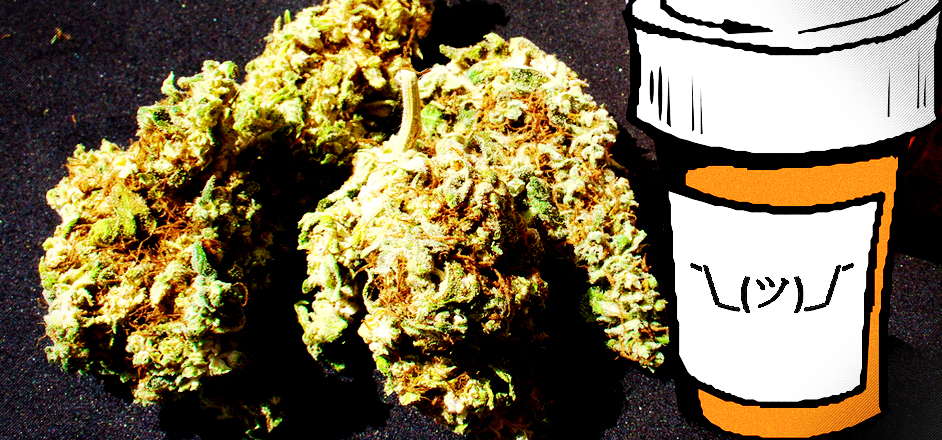Your brother's friend's sister that had her 'chronic sepultasia' cured with edibles isn't a legitimate source …
As far as the scientific community is concerned, we don’t really know anything about weed.
At least, that’s the overall gist of a new extensive report which was responsible for analyzing all credible research surrounding cannabis.
In one of the biggest campaigns of its kind since the late ‘90s, a committee was put into place to try and separate fact from fiction by reviewing over 10,700 abstracts of already done research. Called The Health Effects of Cannabis and Cannabinoids: The Current State of Evidence and Recommendations for Research (2017), the topics reviewed cover various areas like whether or not CBDs really aid in symptoms of epilepsy to what we know about the hazards of driving while on it — and everything in between.
A previous report of its kind, dubbed Marijuana and Medicine: Accessing the Science Base, was contracted and published by the White House in 1999. Since, there has been a substantial amount of studies and analysis by way of weed and it’s potential uses as medicine (or not). But as the new paper suggests, there’s not enough of it yet. Not even close.
However according to the report, there are a few conclusive facts about it. Cannabis alleviates pain, helps cancer patients manage side effects of chemo and even improves a few conditions of multiple sclerosis. That much is abundantly clear. We’re still in the dark about its effects on PTSD, depression, anxiety, sleep, cancer, IBS and many other things that pro-pot activists swear by though.
Keep in mind, the report never comes close to suggesting that weed has no medicinal value or that it's inherently dangerous, quite the opposite. All it does is categorize the areas of research that need focus — especially given the fact that over half of the nation now accepts legal weed in some form or another. The landscape is changing, quickly, it says. Research needs to catch up in order for lawmakers (and users for that matter) to make the right decisions.
The multi-expert panel even goes so far as to blame the government for dragging its feet with restrictive policies, obstacles that are keeping valuable conclusions from ever seeing the light of day. As of now, there are only a handful of approved labs that can research the benefits (and risks) of cannabis because of its schedule I classification.
“Despite these changes in state policy and the increasing prevalence of cannabis use and its implications for population health, the federal government has not legalized cannabis and continues to enforce restrictive policies and regulations on research … ” the paper states. “These policies and regulations may impose barriers to conducting research on the health effects of cannabis and cannabinoids has been limited in the United States, leaving patients, health care professionals, and policy makers without the evidence they need to make sound decisions regarding the use of cannabis and cannabinoids. This lack of evidence-based information on the health effects of cannabis and cannabinoids poses a public health risk.”
The report categorizes over 100 perceived benefits and risks of cannabis by how much information there is available to make specific (data backed) analysis. Each is labeled by either ‘conclusive, substantial, moderate, limited or no (or insufficient) evidence.'
A few highlights include:
There is Conclusive Evidence That Weed …
- aids in the treatment of chronic pain in adults.
- treats chemo-induced nausea and vomiting.
- improves some symptoms of multiple sclerosis.
There is Substantial Evidence That Weed …
- increases the risk of motor vehicle crashes.
- lowers birth weight of infants (if mothers use while pregnant).
There is Moderate Evidence That Weed …
- improves sleep for people with sleep apnea, fibromyalgia, chronic pain and MS.
- impairs learning, memory, and attention.
- is not responsible for lung, head or neck cancer.
- is responsible for increased incidences of successful suicide.
There is Limited Evidence That Weed …
- increases appetite or aids in weight loss associated with HIV/AIDS.
- improves symptoms of Tourette syndrome.
- improves anxiety symptoms.
- improves symptoms of PTSD.
There is No or Insufficient Evidence That Weed …
- cures cancers, including glioma.
- alleviates symptoms of Irritable Bowel Syndrome (IBS).
- treats epilepsy.
- helps kick other addictive substances.
- can kill someone due to overdose.
- aids with depression.
Obviously, there are gaping holes in our understanding of the plant that need be plugged before people continue to digest possible misinformation or heresy. Though considering the strong evidence there are at least 3 substantial benefits of it already, a schedule I classification seems off, especially seeing as how that keeps people in the scientific community from actually doing the research the nation needs now to fill in the gaps.
The reality is, a lot of smart people have their hands tied because of marijuana's DEA classification. The restrictive nature of the agency's rules makes it all but impossible to legitimately study the plant, and effectively puts American citizens at risk because of how quickly the laws are changing in the country in regards to its state-sanctioned legalities.
As the paper itself concludes: Something's gotta happen, and that something's gotta happen quick.



Leave a Reply
You must be logged in to post a comment.